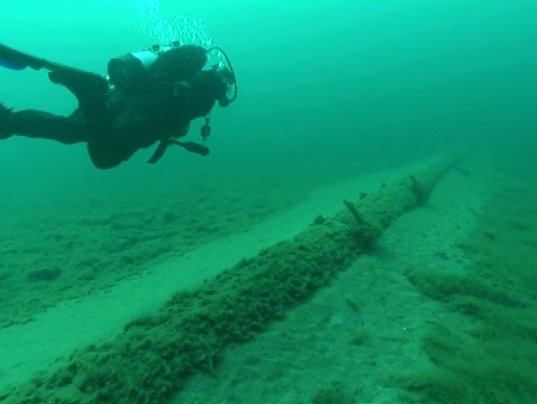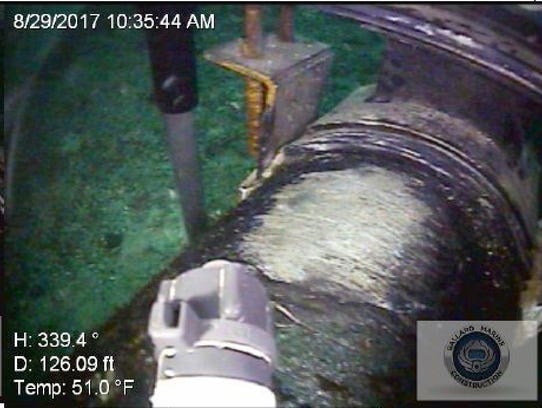Detroit Free Press
Line 5 oil pipeline in Straits of Mackinac dented by ship
By Keith Matheny, Detroit Free Press April 11, 2018
Sixteen sections of underwater oil and gas pipelines in the Straits of Mackinac were found unsupported on the Great Lakes bottom during 2003 inspections — spans of 140 feet or longer, well beyond state requirements for mooring the pipe. Keith Matheny/Detroit Free Press
 (Photo: National Wildlife Federation)
(Photo: National Wildlife Federation)
The same “vessel activity” that appears to have damaged submerged electric cables in the Straits of Mackinac last week, causing a leak of 550 gallons of benzene-containing coolant, may have also caused three dents just discovered in the Line 5 oil and natural gas liquids pipeline, also underwater where lakes Michigan and Huron connect.
Canadian oil transport giant Enbridge, who owns and operates Line 5, informed state officials late Tuesday of the dents, characterized as “very small” and posing “no threat to the pipeline,” Gov. Rick Snyder’s office said in a statement Wednesday.
“An anchor strike was the largest risk identified in a previous independent analysis of the Enbridge pipeline, which is apparently what happened in the Straits last week,” Snyder said.
Enbridge spokesman Ryan Duffy, in an e-mail to the Free Press Wednesday, said the dents were discovered in reviews undertaken following news of damage and coolant leaking from Wisconsin-based American Transmission Co. submerged power cables in the Straits. The cables lie a few hundred yards west of the western-most of Enbridge’s twin pipelines, Duffy said.
“Enbridge took immediate action after learning of the damage to ATC’s cables in the Straits of Mackinac – possibly caused by vessel activity that is under a marine casualty investigation by the U.S. Coast Guard,” Duffy said.
“Following a series of inspections of Line 5 in recent days, we have confirmed dents to both the East and West segments of Line 5. A review of all leak detection systems and available data indicates the structural integrity of the pipelines has not been compromised. We are working closely with the State, the Coast Guard and PHMSA (the federal Pipeline and Hazardous Materials Safety Administration) to provide updates on our inspections and our plans moving forward.”
Duffy added that Enbridge is “taking immediate action to assess appropriate, reinforcing repairs.”
 An image from underwater inspections of Line 5 in the Straits of Mackinac shows an area of missing protective coating and exposed steel. State officials are concerned, because it appears this damage was caused during the installation of anchor supports for the pipeline, without any repair or reporting of the coating damage. (Photo: Michigan Department of Environment)
An image from underwater inspections of Line 5 in the Straits of Mackinac shows an area of missing protective coating and exposed steel. State officials are concerned, because it appears this damage was caused during the installation of anchor supports for the pipeline, without any repair or reporting of the coating damage. (Photo: Michigan Department of Environment)
Line 5 moves 23 million gallons of oil and natural gas liquids per day through the Upper Peninsula, splitting into twin, underwater pipelines through the Straits, before returning to a single transmission pipeline through the Lower Peninsula and on to a hub in Sarnia, Ontario.
Concerned citizens and environmentalists have called for the decommissioning of the 65-year-old Straits pipelines, stating a spill like the one on Enbridge’s Line 6B pipeline near the Kalamazoo River in 2010 would devastate the Great Lakes, shoreline and island communities, as well as the state’s economy.
“Pipelines do not belong in the Straits of Mackinac, period,” said Sean McBrearty, coordinator of Oil and Water Don’t Mix, a coalition of nonprofit organizations, citizens and businesses opposed to oil continuing to flow through the 65-year-old, underwater lines.
“Our state’s economy, tourism, and way of life revolves around keeping our Great Lakes in a pristine condition. There’s simply too much at stake to keep Line 5 in operation.”
Snyder called on Enbridge to accelerate both identification of anchor strike mitigation measures, as well as evaluation of alternatives to replace the Straits pipelines, measures called for in an agreement between Enbridge and state officials last November.
State officials have appeared supportive of a proposal to create a tunnel beneath the Straits, in which to operate a north-south oil pipeline and remove the lines from the water.
“Assuming studies show a tunnel is physically possible and construction would not cause significant environmental damage, the Governor will move to require Enbridge to construct the tunnel and decommission the existing Line 5 that runs under the Straits of Mackinac,” the statement from the governor’s office Wednesday stated.
Mike Shriberg, executive director for the National Wildlife Federation’s Great Lakes Regional Center and a member of the state’s Pipeline Safety Advisory Board, questioned that approach.
“For the first time, Governor Snyder has called for the decommissioning of Line 5, which is the right thing to do,” Shriberg said. “However, pushing forward on the tunnel presumes that it is the best pathway for the state. What we know is that Line 5 is not critical infrastructure and that there are alternatives which do not endanger the Great Lakes.”
Enbridge has raised the anger of state officials over the past year with revelations the company knew a section of the required protective coating on its twin, underwater oil pipelines was damaged in 2014 — but did not make state officials aware of it until August 2017.
Enbridge has also failed to maintain an adequate spacing of anchor supports holding the pipeline on the Straits bottom, as required in its 1953 easement with the state. And amid a state-mandated review of anchor supports last year, Enbridge disclosed that of 48 anchor supports it had inspected, the majority had adjacent segments of the pipelines with missing, protective coating.
Lt. Gov. Brian Calley on Wednesday called for state Attorney General Bill Schuette to initiate legal action on behalf of the state against the ship’s owners and anyone else responsible for the cable and pipeline damage.
“There is no excuse for the ship’s actions, which risked devastating environmental harm as well as the loss of vital infrastructure for communications, electrical power and heat for residents of the Upper Peninsula,” he said in a statement.
“I have asked the Attorney General to begin legal action against the ship’s owners immediately to ensure every member of the maritime community understands the no-anchor zone is vital.”
But Coast Guard Petty Officer 2nd Class Christopher Yaw said investigators were not yet ready to identify a particular ship responsible for the damage, and couldn’t yet confirm that an anchor strike caused the damage.
“We’re still investigating any causes,” he said. “That’s still being looked at.”
Contact Keith Matheny: 313-222-5021 or kmatheny@freepress.com. Follow on Twitter @keithmatheny.
